Labour leadership: Where the candidates stand
- Published
Ballot papers have gone out to Labour Party members, politicians and union activists to decide who will succeed Gordon Brown as leader of the Labour Party. Where do the five candidates stand on the key issues?
DIANE ABBOTT
Future of Labour: Party needs to move on from New Labour and to restore internal democracy - new leader should be someone who was not part of the New Labour elite nor the "culture of spin".
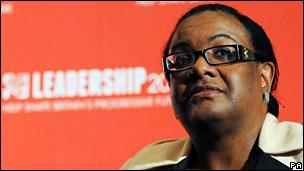
Diane Abbott says the party needs to move on from New Labour
Cutting the deficit: Agrees deficit should be cut over course of this Parliament but says planned cuts will widen deficit - instead she would promote investment to create jobs. The balance between public sector cuts and taxation needs to be looked at and it is not a question of the timing of the cuts, but "a question of having this level of cuts at all".
Policy priorities: Regain civil liberties as issue for the Left, debate Afghanistan and whether the conflict is winnable, against cuts to public sector, backs scrapping Trident and a staged withdrawal from Afghanistan, favours keeping 50p tax rate permanently, backs a wealth tax.
Quote: "We're not going to be able to engage with society and, particularly, engage young people in politics, if they see the political class as a caste apart, a strange sort of geeky young men in suits."
ED BALLS
Future of Labour: Must listen to voters, strengthen base and use members and unions to get message across, reform the party's national policy-making body, create fund to support more people from ethnic minorities who stand for elected office, extend £1 youth membership rate to newly affiliated trade unions for first year.
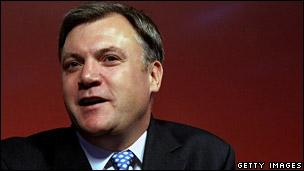
Ed Balls supports looking again at EU freedom of movement rules
Cutting the deficit: Deficit should be reduced in "steadier" way than coalition plans - Labour should set out plans to boost jobs and growth and for "fair tax rises". Has said a pre-election Labour pledge to halve deficit in four years was a "mistake" - saying the pace of spending cuts was "not deliverable".
Policy priorities: Graduate tax instead of tuition fees, supports renegotiating Freedom of Movement Directive on EU migration and transitional restrictions on migration from future new EU states, opposes VAT rise.
Quote: "We need a leader who can translate theory and ideas into real policies and lead through campaigning - not as a pressure group agitator but genuinely offering an alternative programme for government. We must find the right language for our policies and show that we 'get it'. We will not win the next election in seminars, party forums or university halls."
ANDY BURNHAM
Future of Labour: Need to reconnect with principles of fairness and grassroots - party has been too controlling and cautious, should consult members on daily basis, reduce influence of "elites" at top of party, reduce membership fees, more involvement for members and supporters, more use of technology to promote instant debate.
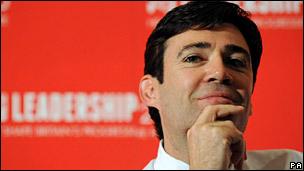
Andy Burnham wants Labour to reconnect with its members
Cutting the deficit: Favours a 6:4 ratio for tax rises and spending cuts and says the coalition is not getting the balance right. He has said he would make a "moral case" for tax playing a bigger part in reducing borrowing.
Policy priorities: Public service reform based on individual control - like personal care budgets, supports a "living wage", tackling unemployment, would look at changing the benefit system to address concerns about immigration, would keep 50p tax in "medium term", voting system reform not a priority, backs national care service for elderly funded by 10% tax on all estates after death.
Quote: "We were wrong not to listen to the concerns of our supporters. We were wrong not to take those concerns seriously and respond accordingly. And we were wrong to take our supporters for granted. I share the responsibility for that as a senior party figure. Now I want to learn from those errors, to reconnect with our members and supporters and galvanise the party into the powerhouse it can and should be."
DAVID MILIBAND
Future of Labour: Party must leave the Blair-Brown era behind to become "Next Labour"; renew ideology and ideas, double membership, ensure one third of shadow ministers are female
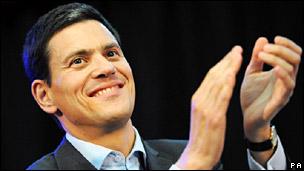
David Miliband says politics has moved on from the 'demons of the 1980s'
Cutting the deficit: Would reduce the deficit by a 2:1 ratio of cuts to tax increases instead of the Tories' 4:1 split
Policy priorities: Fairer society - tackling inequality, return to full employment, fair pay and equal pay for women, close education gap between rich and poor, create thousands of "green" jobs, continue welfare reform, keep 50p tax rate for this parliament, supports mansion tax and bankers' bonus tax, supports bringing in the alternative vote (AV) system for Westminster elections.
Quote: "The tragedy of the 2010 election is that for too many people we ceded the mantle of both progress and reform - the former on the issues of political change and inequality, the latter on public services and the economy. We were trapped by Labour's demons of the 1980s when politics has moved on."
ED MILIBAND
Future of Labour: Party must rediscover radicalism and become a movement and a cause, give members a proper voice, reach out more to trade unions, voluntary sector, community and environmental groups, move beyond old Blairite/Brownite divisions to unite around ideas, believes a third of shadow cabinet should be women but would also support Harriet Harman's 50% proposal.
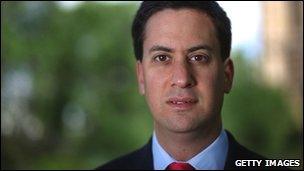
Ed Miliband wants Labour to be a 'party of idealists'
Cutting the deficit: Labour's plan to halve deficit in four years is "starting point" but more could be raised through tax - such as a higher bank levy.
Policy priorities: Climate change and environment, reform state to make it more accountable, elderly care, create skilled jobs, backs a "living wage", would keep 50p tax rate permanently, graduate tax instead of tuition fees, right to request flexible working for all workers and fair pay review for public and private sectors.
Quote: "The road back to power isn't simply about analysing election results, it is about fundamental beliefs. We must build a wider movement that can show in opposition that we are rooted in people's lives. We must show that we are a party of idealists not just managers."